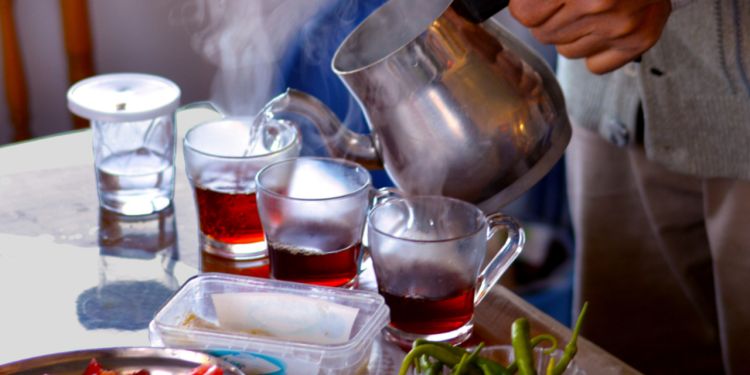Turkish culture and traditions

Traditions dating back to the Ottoman era still permeate Türkiye, along with modern influences to form a unique blend-specific Türkiye. Affinity with Turkish culture is the driver prompting many expats to relocate to the country in the first place. If you are not familiar yet with the Turkish lifestyle, great surprises are waiting for you, and Turkish people's generosity and warmth will definitely contribute to making you want to stay.
The Turkish language
The Turkish alphabet consists of 29 letters - those of the Latin alphabet minus Q, W and X, plus 6 additional characters (Ğ, ğ, Ş, ş, İ and ı) tailored for the phonetic requirements of the language. Indeed, when it comes to writing, Turkish is completely phonetic: each letter refers to a particular sound, and every word is written exactly as it is pronounced. There are no ths, shs, or chs in Turkish; all sounds refer to a single letter.
The Turkish language encompasses many loanwords of Arabic (e.g., hediye, which means gift) and French (e.g., plaj, meaning beach) origins.
Let's put it bluntly: everyone does not speak English, especially if you venture off the beaten tracks and out of the big cities. However, most people are curious, open-minded and more than willing to try and communicate with foreigners by any means available – from body language to translating apps. If you can speak even a few words of Turkish, local people will genuinely appreciate and encourage your effort, turning a lenient eye on your mistakes.
Useful link:
A Turkish radio station to help you become familiar with Turkish sounds.
The belief system in Türkiye
An overwhelming majority of the population is Muslim, as emphasized by the country's flag, which represents the Islamic crescent. However, the country has a history of cultural diversity and is, for example, home to many churches and synagogues. Freedom of religion is a constitutional right enshrined by Ataturk on the occasion of the establishment of the secular republic of Türkiye.
The Turkish society is very prone to superstitions derived from pre-Islamic traditions. One of the most mainstream is the 'boncuk', a glass bead representing a stylised blue eye, said to shield its bearer from bad luck.
The 'fal' (fortune-telling) is also a very common practice in Türkiye, especially among young women trying to get a sneak peek at their future husbands. This tradition is usually accompanied by a cup of Turkish coffee. The ¨fal¨ reader makes guesses from the shapes formed by the leftover coffee grounds in the cup.
The Turkish Calendar
Türkiye follows the Gregorian calendar and falls within the GMT 03:00 time zone.
In addition to secular events (such as Republic Day on October 29th or Labor Day on May 1st), the Turkish calendar also celebrates major Islamic highlights.
For example, the Ramazan Bayrami, which marks the end of the Ramadan fast, gives way to a four-day public holiday and to large celebrations. Similarly, the Kurban Bayrami (Sacrifice Feast), commemorating the sacrifice of Ibrahim (Abraham), is held around 2 months later. Although both these festivals have fixed dates according to the Islamic lunar calendar, their equivalence in the Gregorian calendar drifts by around ten days every year.
Useful link:
Traditional activities in Türkiye
One of the most popular activities in Türkiye is, well, not that active, as it basically boils down to sitting and chatting (around cups of tea, a hookah, or a plate of pastries) with friends or neighbors. One could playfully say that 'dedikodu' (gossip) is a national sport.
Women traditionally used to meet at the 'hammam' – steam baths where you can avail yourself of various body care treatments –, and many men, keeping alive an old tradition, still sit in the street to play 'tavla', a local version of the game of backgammon.
In Western Türkiye, particularly in coastal regions, a relaxed and outdoor-oriented lifestyle is a significant part of the local culture. Here, people often embrace the scenic beauty of the Aegean and Mediterranean coasts by engaging in leisurely activities like sitting in camping chairs by the beach. This practice is not just about enjoying the sun and the sea; it's a social affair where friends and families gather to unwind and connect with each other.
Picnics are another popular activity along these beautiful coastlines. Locals, as well as expats, are drawn to the idyllic settings for their picnics, often featuring an array of traditional Turkish dishes and refreshments. These gatherings are a testament to the Turkish love for nature and community, offering a chance to enjoy the outdoors while sharing food, stories, and laughter. The combination of stunning natural landscapes and a warm, communal atmosphere makes these beachside picnics and gatherings a cherished aspect of life in Western Türkiye.
Hospitality in Türkiye
Foreigners are often surprised by Turkish warmth, hospitality and willingness to help. Out of the blue, a street seller may offer you a fruit or a flower; if you are lost, most strangers will take the time to kindly guide you, going so far as to walk you home or invite you to theirs for tea.
Turkish hospitality and social interactions, of course, have their own unspoken rules. Among the most prevalent, you should always remember to remove your shoes before entering a Turkish home. Missing a meal or refusing to taste a dish offered by your Turkish hosts is also considered rude.
Traditions and practices, however, change with regions and people, and the best way to fit in is, as always, to observe the way people around you behave and try to adjust accordingly.









